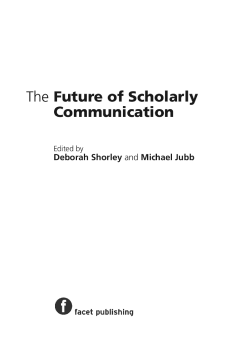
Additional Information
Book Details
Abstract
Global thought-leaders define the future of research communication. Governments and societies globally agree that a vibrant and productive research community underpins a successful knowledge economy but the context, mechanisms and channels of research communication are in flux. As the pace of change quickens there needs to be analysis of new trends and drivers, their implications and a future framework. The editors draw together the informed commentary of internationally-renowned experts from all sectors and backgrounds to define the future of research communication. A comprehensive introduction by Michael Jubb is followed by two sections examining changing research behaviour and the roles and responsibilities of other key actors including researchers, funders, universities, research institutes, publishers, libraries and users. Key topics include; changing ways of sharing research in chemistry, supporting qualitative research in the humanities and social sciences, creative communication in a 'publish or perish' culture, cybertaxonomy, coping with the data deluge, social media and scholarly communications, the changing role of the publisher in the scholarly communications process, researchers and scholarly communications, the changing role of the journal editor, the view of the research funder, changing institutional research strategies, the role of the research library and, the library users' view. This is essential reading for all concerned with the rapidly evolving scholarly communications landscape, including researchers, librarians, publishers, funders, academics and HE institutions.
Deborah Shorley was until 2012 Director of Library Services at Imperial College, London. An active member of her profession, Deborah frequently contributes to national and international conferences and in 1998 was awarded the Library Association's Charter Centenary Medal. She has been head of UKRR (UK Research Reserve) since 2007 and was until Chair of MIMAS, a member of JISC Collections Board, on the Board of LIBER (Ligue des Bibliotheques Europeennes de Recherche - Association of European Research Libraries) and a member of the Conseil Scientifique of ABES (Agence Bibliographique de l'Enseignement Superieur). She was elected to the Research Libraries UK Board in 2008. She currently acts as Scholarly Communications Adviser to Imperial. Michael Jubb is Director of the Research Information Network (RIN). He has a long-standing background as an academic, archivist and senior research manager and has been Deputy Chief Executive of the Arts and Humanities Research Council. He has been responsible for over 30 reports on key aspects of the changing scholarly communications landscape.
In The Future of Scholarly Communication, editors Shorley and Jubb capture the sense of "ferment" that currently exists on this topic through the voices of contributing disciplinary researchers, publishers, and librarians…The volume is important because it demonstrates that changes taking place now are likely affecting all scholars in every field and will greatly affect academic and research libraries worldwide.
Technicalities
I would recommend this book to the people who want to know more about scholarly communication and to those who know quite a lot about it and would like to expand their understanding. All the chapters are written in an accessible style and most of them have a moment of intrigue and surprise in them
Information Research
